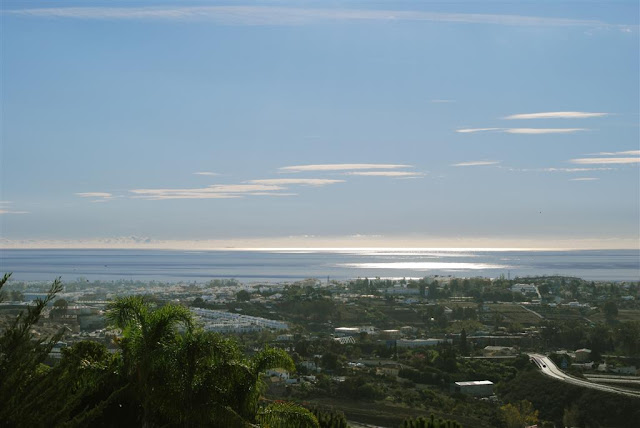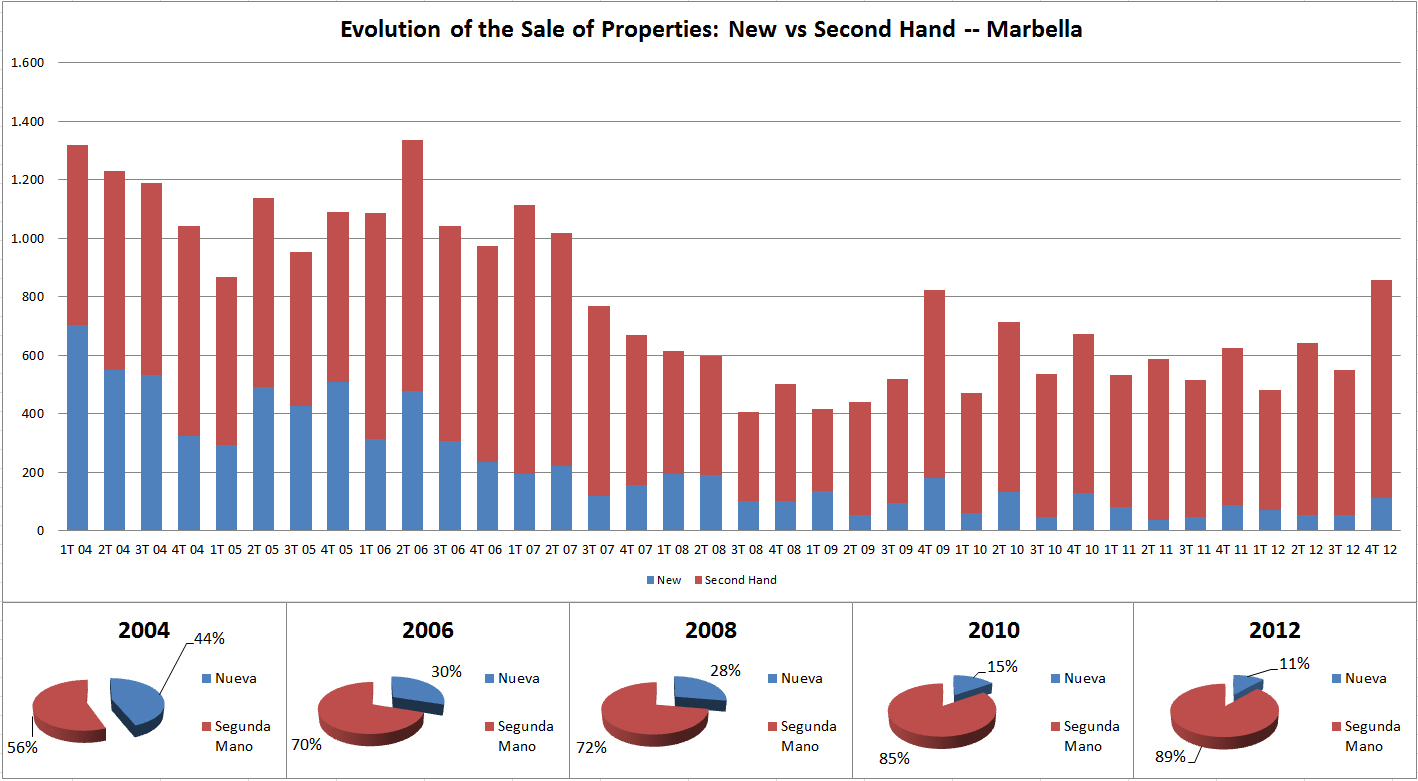La situación no es tan buena para Marbella, a pesar de que está mejorando. Los números no son los mismos que los de los años de expansión, pero hay un aumento del 12,8% en comparación con 2011. Mi experiencia en el año 2012 y el comienzo de este 2013 me dice que todavía es muy difícil mantener operaciones de cierre pero un buen conocimiento del mercado y un enfoque de marketing extenso lo hacen posible.
Menu
2012 fue un buen año
Resulta increíble escuchar los comentarios de todo el mundo sobre el mercado inmobiliario de la Costa del Sol, pero son ciertos. 2012 ha sido el tercer mejor año en transacciones cerradas en Benahavis justo después de los años previos a la crisis de 2006 y 2007. Una conclusión sencilla: si usted tiene un precio competitivo y una exposición de un buen marketing, las propiedades se venden.
La situación no es tan buena para Marbella, a pesar de que está mejorando. Los números no son los mismos que los de los años de expansión, pero hay un aumento del 12,8% en comparación con 2011. Mi experiencia en el año 2012 y el comienzo de este 2013 me dice que todavía es muy difícil mantener operaciones de cierre pero un buen conocimiento del mercado y un enfoque de marketing extenso lo hacen posible.
La situación no es tan buena para Marbella, a pesar de que está mejorando. Los números no son los mismos que los de los años de expansión, pero hay un aumento del 12,8% en comparación con 2011. Mi experiencia en el año 2012 y el comienzo de este 2013 me dice que todavía es muy difícil mantener operaciones de cierre pero un buen conocimiento del mercado y un enfoque de marketing extenso lo hacen posible.
2012 was a good year
Incredible if you hear the comments of everybody about the real estate market of the Costa del Sol, but true. 2012 has been the third best year in closed transactions for Benahavis just after the pre-crisis years 2006 and 2007. An easy conclusion: if you have a competitive price and a good marketing exposure, the properties sell.
The situation is not that good for Marbella although it is improving. The numbers are not the same as those of the boom years but there is a 12,8 % increase when compared to 2011. My experience in 2012 and the beginning of this 2013 tells me that it is still quite hard to keep on closing transactions but a good knowledge of the market and an extensive marketing approach makes it possible.
The situation is not that good for Marbella although it is improving. The numbers are not the same as those of the boom years but there is a 12,8 % increase when compared to 2011. My experience in 2012 and the beginning of this 2013 tells me that it is still quite hard to keep on closing transactions but a good knowledge of the market and an extensive marketing approach makes it possible.
April 30th, 2013
Me llamo Alfonso de Remax, queria agradecerte a ti que le me mantengas como agente de tu casa.
Alfonso es amigo mio y gran profesional.
Espero que se pueda vender pronto tu casa.
Un fuerte abrazo,
FB
Alfonso es amigo mio y gran profesional.
Espero que se pueda vender pronto tu casa.
Un fuerte abrazo,
FB
SOLD IN ONE WEEK! Las Terrazas
Beautiful property, amazing views and quite location. The team did a perfect job to be able to sell to one of our Swiss clients. As every operation in this complicated times, it turned a little bit complicated but at the end the results are there.
The result was that only one week after listing we had the property sold.
The result was that only one week after listing we had the property sold.
The Certificate of Energy Performance for properties is here.
The Spanish Government, after a period of uncertainties, has finally approved the need of a Certificate of Energy Performance for properties being offered for sale and rental (in this case only if the rental period is longer than four months). This Certificate will be compulsory from June 1st and has to be shown upon request to all potential buyers or renters. The Certificate has to show the energy efficiency rating, information on the energetic characteristics of the constructions and recommendations for the improvement of the rating so potential clients can value and compare the energetic efficiency of each property.
SOLD! Now a plot on the Ronda road.
We keep on going with a great pace and 2013 may be a good year for us. We are improving our marketing skills and, therefore, increasing the expousure of our properties so they are sold is less time with a lesser percenatge of negotiation for the benefit of our clients.
It is an amazing plot that we had already sold some time ago but that, for market circumstances, felt. Gated complex and extraordinary views was more than enough to atrack clients.
It is an amazing plot that we had already sold some time ago but that, for market circumstances, felt. Gated complex and extraordinary views was more than enough to atrack clients.
How is sale of second hand properties vs new properties evolving
I thought this was an interesting exercise so I have devoted my monthly newsletter article to it. The results for Benahavis can be seen on the attached chart.
In summary, in Benahavis the evolution is quite clear. During the pre-crisis years, developers were putting a lot of new properties in the market and they were being sold. Buyers preferred to purchase new properties, there were plenty of options and the price was not the main concern because prices were going up and no one ever imagined what was coming. At the same time, developers kept introducing lots of properties into the market so the conclusion is that most of the properties sold were new.
However, since 2009, the situation has changed radically. Most of the new developments were finished by that year and developers were reluctant to adjust prices to the market. Due to the strong falling of prices, it is easy for an individual second hand seller to adjust its price to the market than for a development company that has, in theory, to produce benefits and, in most of the cases, was financed by a bank that was not ready to accept a loss in its loans. At the end, the developers had to do it to be able to sell and the stock of new properties is going down since then because only a couple of developers, and mainly Taylor Wimpey in Los Arqueros, are bringing new properties to the market. The conclusion is that, right now, most of the properties sold are second hand.
On the other hand, the situation in Marbella is a little bit different. After the construction boom between 2000 and 2004 and specially once the crisis hit the area, there were not many developments incorporating product to the market so the stock of new properties has been declining since then. The evolution is quite clear: from 44% of new properties sold in 2004 to 11% in 2012.
Venta de segunda mano frente a nuevo: como ha sido la evolución
He creído que sería interesante ver dicha evolución para saber donde estamos. Los resultados para Benahavís se pueden ver en la tabla adjunta.
En resumen, la evolución es clara. Durante los años pre-crisis, los promotores ponían muchas propiedades en el mercado que se vendían. Los compradores siempre prefieren comprar propiedades nuevas, en aquella época había mucho donde elegir y el precio no era el problema principal porque los precios seguían subiendo y nadie podía imaginar lo que se venía encima. La conclusión es que la mayoría de lo que se vendía era nuevo. Sin embargo, desde 2009, la situación ha cambiado radicalmente. La mayoría de las nuevas promociones ya estaban terminadas en ese año y los promotores eran todavía reacios a bajar los precios para ajustarse al nuevo mercado a la baja. Debido a la importante bajada de los precios, es más fácil para un propietario particular ajustar su precio al mercado que para una promotora inmobiliaria que, en teoría, tiene que producir beneficios y que, en la mayoría de los casos, tiene financiación de un banco que no esta dispuesto a aceptar fácilmente una quita en sus créditos. Al final, los promotores han tenido que bajar para ser capaces de vender y desde entonces el stock de nuevas propiedades cada vez es menor porque solo unos pocos promotores, y principalmente Taylor Wimpey en Los Arqueros, esta poniendo nuevas propiedades en el mercado. La conclusión es que, ahora, la mayoría de las propiedades que se venden son de segunda mano.
¿Es consciente de la obligatoriedad de declarar ingresos y bienes en el extranjero? ¿Quien se considera residente en España?
Siguiendo con el tema que ya inicie el mes pasado sobre la obligación de declarar los ingresos y bienes en el extranjero por parte de los residentes en España, y tal como comente en el artículo del mes pasado, este mes voy a intentar aclarar la normativa en la que se define a quien se considera residente fiscal en España. Este artículo esta basado en un trabajo preparado por D. Francisco Velázquez Cueto de la Agencia Estatal de Administración Tributaria.
Are you aware of the obligation to declare worldwide assets and income by Spanish residents? Who is considered Spanish resident? (2)
Following with the same matter I discussed last month on the obligation to declare world wide assets by Spanish residents and as I mentioned on last month’s article, this newsletter is going to discuss who is considered a tax resident in Spain. The article is based on a presentation prepared by Mr. Francisco Velazquez Cueto from the Spanish Tax Office.
Subscribe to:
Comments (Atom)







.jpg)




